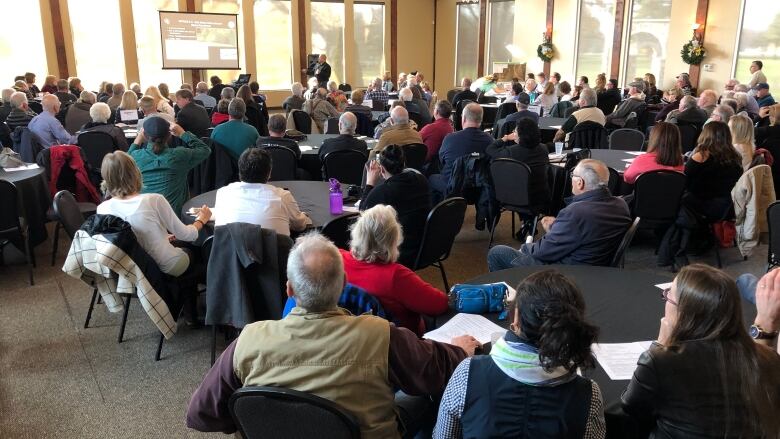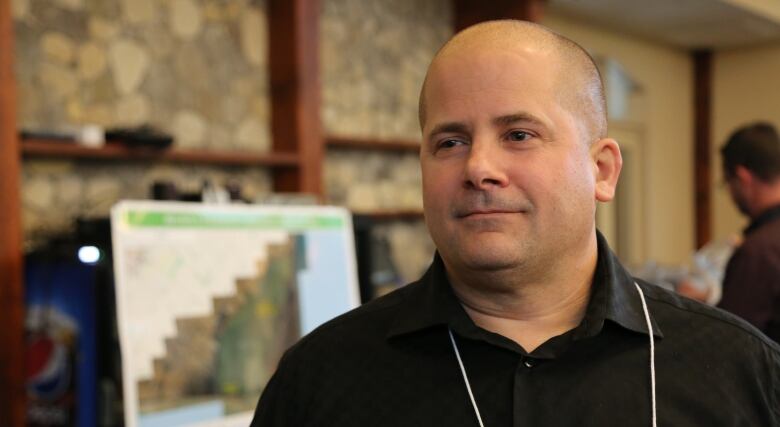Chatham-Kent residents frustrated after shoreline study meeting
Environmental consultant says reduced winter ice cover along Lake Erie could increase storms, shore damage

Dozens of Chatham-Kent residents descended on the Links of KentGolf Club Tuesday to receive the latest updates on an ongoing Lake Erie shoreline study.
Peter Zuzek, president of Zuzek Inc, theenvironmental consulting agency leading the study, provided residents with a number of solutions to mitigate shoreline erosion along Lake Erie.
Included in the presentation was an option to move homes and residents away from the shore, as well as an infrastructure project that would see the construction of an armour stone retaining wall that could cost upwards of $1 billion.
Residents who spoke with CBC News following an afternoon presentation expressed frustration with the potential costs associated with some of the mitigation options, as well as with the previously implemented solutions that they say have since failed to produce meaningful results.
Susan O'Brien, who lives along Erie Shore Drive, said residents have largely been the ones responsible for implementing shoreline protections, "usually in the form of a steel break wall or rocks armour stone."

"Some have done nothing, but it's created because everyone's doing their own thing an acceleration of the shoreline erosion," she said.
At the same time, she said protections implemented by the municipality, including wooden drain systems from Erie Beach to Erieau, haven't been properly maintained.
"So they're now underwater," she said.
O'Brien said the option of protecting Talbot Trail and nearby buildings with an armour stone retaining wall was "probably doable."

However, the proposed $600 million to $900 million price tag plusthe annual one per cent cost of maintaining the structure was cause for concern.
"The cost is significant," she said.
Zuzekalso acknowledged that "the costs are very, very large."
"But to be clear, we're not only planning for the future that we ... [face] right now," he said. "With this study, we're integrating the impacts of climate change on our weather in the future."
Reduction in winter ice is 'one of the more important findings'
While the final report won't be published until 2020, Zuzek, said the loss of winter ice cover over Lake Erie was "one of the more important findings.".
"The reduction in winter ice cover is going to mean more impacts from storms in the future," he said. "So while we're already dealing with a lot of challenges in this community because of the flooding and the erosion hazards we're expecting that that's going to get worse in the future."
According to numbers presented during both of Tuesday's presentations, winter-time wave energy along Lake Erie may increase by 70 per cent to 120 per cent by the end of the century.
Additionally, shoreline erosion rates may increase between 70 per cent and 120 per cent within that same timeframe.
"For the projections into the future, due to climate change and the warming that's anticipated, if this plays out these lakes won't have ice by the late century which means there'll be more impacts from storms in the future during the wintertime," Zuzek said.
In terms of next steps, Zuzek said the plan is to process all of the feedback provided by residents in order to begin drafting a final report.
"We'll be making a presentation to council and then wrapping up everything by the end of March 2020," he said.
With files from Amy Dodge












_(720p).jpg)


 OFFICIAL HD MUSIC VIDEO.jpg)
.jpg)



























































































